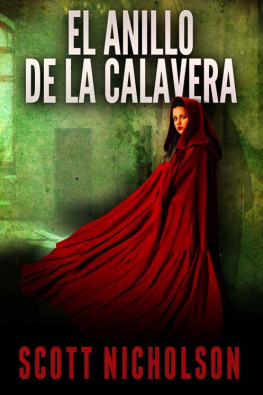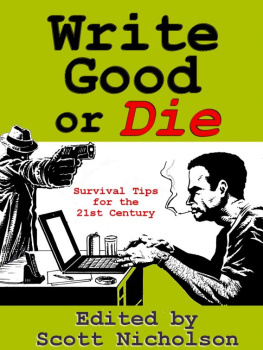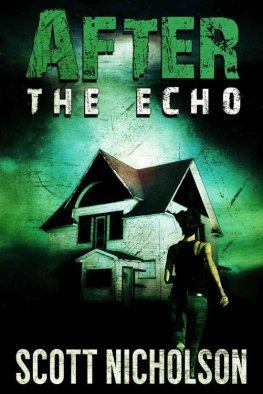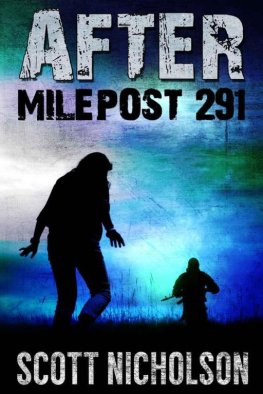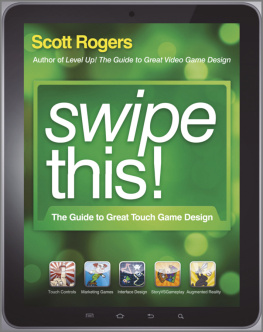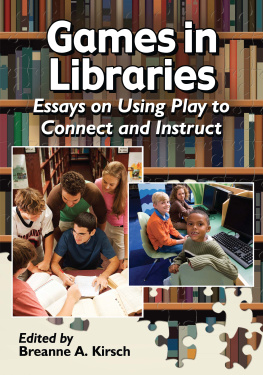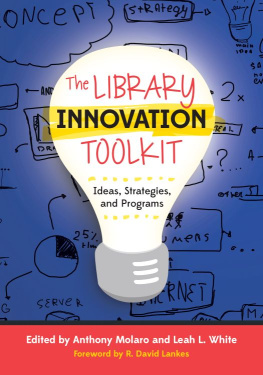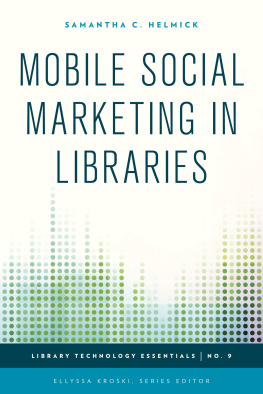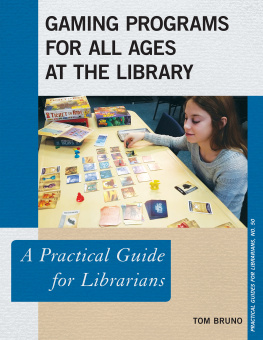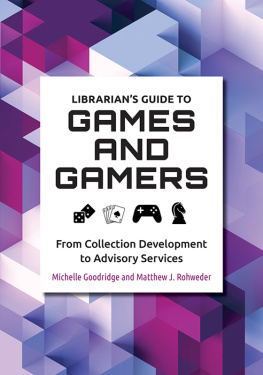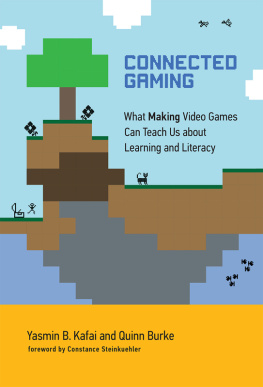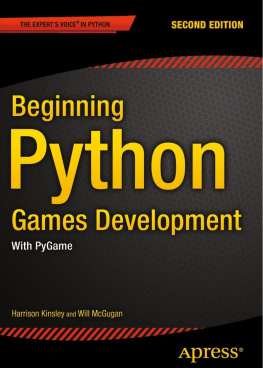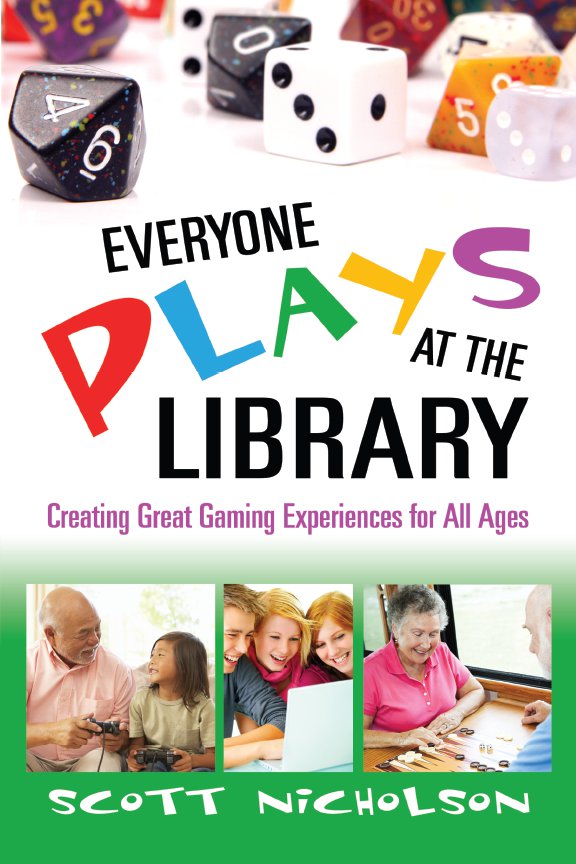First Printing, 2010
Everyone Plays at the Library:
Creating Great Gaming Experiences for All Ages
Copyright 2010 by Scott Nicholson
All rights reserved. No part of this book may be reproduced in any form or by any electronic or mechanical means, including information storage and retrieval systems, without permission in writing from the publisher, except by a reviewer, who may quote brief passages in a review. Published by Information Today, Inc., 143 Old Marlton Pike, Medford, New Jersey 08055.
Publishers Note: The author and publisher have taken care in the preparation of this book but make no expressed or implied warranty of any kind and assume no responsibility for errors or omissions. No liability is assumed for incidental or consequential damages in connection with or arising out of the use of the information or programs contained herein.
Many of the designations used by manufacturers and sellers to distinguish their products are claimed as trademarks. Where those designations appear in this book and Information Today, Inc. was aware of a trademark claim, the designations have been printed with initial capital letters.
Library of Congress Cataloging-in-Publication Data
Nicholson, Scott.
Everyone plays at the library : creating great gaming experiences for all ages / Scott Nicholson.
p. cm.
Includes index.
ISBN 978-1-57387-398-7
1. Libraries--Activity programs. 2. Games. 3. Libraries--Special collections--Games. I. Title.
Z716.33.N53 2010
025.5--dc22
2010010605
Printed and bound in the United States of America
President and CEO: Thomas H. Hogan, Sr.
Editor-in-Chief and Publisher: John B. Bryans
Managing Editor: Amy M. Reeve
Project Editor: Rachel Singer Gordon
VP Graphics and Production: M. Heide Dengler
Book Designer: Kara Mia Jalkowski
Cover Designer: Lisa Conroy
www.infotoday.com
EVERYONE
P L A Y S
AT THE
LIBRARY
I would like to thank Ken Lavender for his ongoing support of my writing, which helps make up for my undergraduate degree in mathematics. I would also like to thank Jenny Levine for laying the groundwork for talking about gaming at a national level. Thanks also go to Jim Scheiderich and Bill Walton for reviewing the sections on war games and role-playing games.
Id also like to offer thanks to the viewers and supporters of Board Games With Scott (www.boardgameswithscott.com). Ive greatly expanded my perceptions on gaming through the connections Ive made there. I offer a special thanks to Funagain Games for its ongoing support of Board Games With Scott and of games in libraries. In addition, I want to thank those of you in Syracuse who have put up with far too many of my wacky games.
Id like to offer a big thanks to the expert panel that Ive worked with through the Verizon Thinkfinity grant: Kelly Czarnecki, Liz Danforth, Christopher Harris, Lisa Janicke Hinchliffe, Terri Kirk, Allan Kleiman, Jack Martin, Dwight McInvaill, Eli Neiburger, Jennifer Nelson, Julie Scordato, and Paul Waelchli. These people, along with the leadership of Dale Lipschultz and the work of Jenny Levine and Beth Gallaway, have helped to provide many different perspectives on gaming in libraries that makes the construction of conceptual models possible. I would also like to thank Rachel Singer Gordon for her editorial work on this book.
Finally, I want to thank someone who Ive gamed with for 20 years: Donald Dennis. He led me through many of my early experiences with gaming and has continued to be there as weve explored many different worlds together. But no matter how many times weve saved the universe, theres still someone in trouble.
Games have always been an important part of my life. As a child, I spent many hours staring at a Chess board, engaging with others over board games, and controlling pixels driven by the Atari 2600 and TRS-80 Color Computer. In high school, I continued with these games and also got engaged in role-playing games, and during my free time in college, I got heavily involved in live-scale role-playing along with other forms of gaming. As I moved into my career, my time for gaming decreased, so I focused more on board and electronic games that took less time in one sitting.
I firmly believe that much of my success in life can be attributed to my gaming hobby. Different games test different skillssome mental, some physical, and some social. These games are similar to exercising in the gym: While you may not have the need to do an upright row in real life, the exercise helps strengthen parts of the body that may not get a regular workout so that your body can respond to real-life situations. Games work the same way: While you may never need to know how to run a plantation in Puerto Rico, that gaming activity stimulates pathways of thought that then help the mind respond to a variety of life situations. The same holds true for the social aspect of gaming: While the activity may not seem like something directly applicable to life, it does allow you to improve your social skills so you can be more flexible in real-world situations.
Gaming has also taught me how to analyze a situation for the underlying rules. In many electronic games, not all of the rules of the game are presented up front; players must experiment within the world to learn the rules. Going through these different worlds, scenarios, and rule sets helps me to navigate the many unstated rule sets that govern life.
At the 2007 American Library Association (ALA) midwinter conference, I first saw Dance Dance Revolution (DDR) applied to a library context by Jenny Levine at the ALA TechSource booth. After we danced, we chatted about how libraries are using games. The rest of that show was a blur, as my mind raced about what was happening and what the potential was. I knew there was much more to gaming than teens and DDR, and I had a lifetime of experience to tap to explore it. After several days of contemplation, I decided to change the path of my research to focus on gaming in libraries.
To have a home for my exploration, I created the Library Game Lab of Syracuse as a part of the Information Institute of Syracuse, run by R. David Lankes. The goal of the Library Game Lab is to explore the intersections between gaming and libraries. Our first project was to gather some baseline data to get a better idea of how many libraries were supporting gaming of all types. We randomly selected 400 public libraries and called them to learn how they work with gaming. We also did a census where we put out a call for libraries to tell us more about their gaming programs.
The data from these studies allowed us to pursue funding. Gaylord, a company that provides libraries with supplies, furniture, and archival solutions, provided considerable assistance with a startup grant that allowed us to purchase the games that are most typically used by libraries. This allowed us to build up the portable Game Lab, which we then used to work with groups of librarians to teach them about the variety of gaming experiences. Taking this lab on the road also helped me to better understand the needs and typical questions that library staff who are new to gaming have.
Gaming continued to grow within ALA, but these discussions tended to take place in a number of small channels specific to a type of library or age of patron. I knew a lot of these different groups could learn from speaking to each other, so I started a Members Initiative Group for Games and Gaming at ALA (connect.ala.org/node/66247). This group brings together people from public, school, and academic libraries to talk about all sorts of games. I wanted to capture the same atmosphere with the Games in Libraries podcast (www.gamesinlibraries.org), and many of the people active in the Members Initiative Group are also voices on the podcast.


